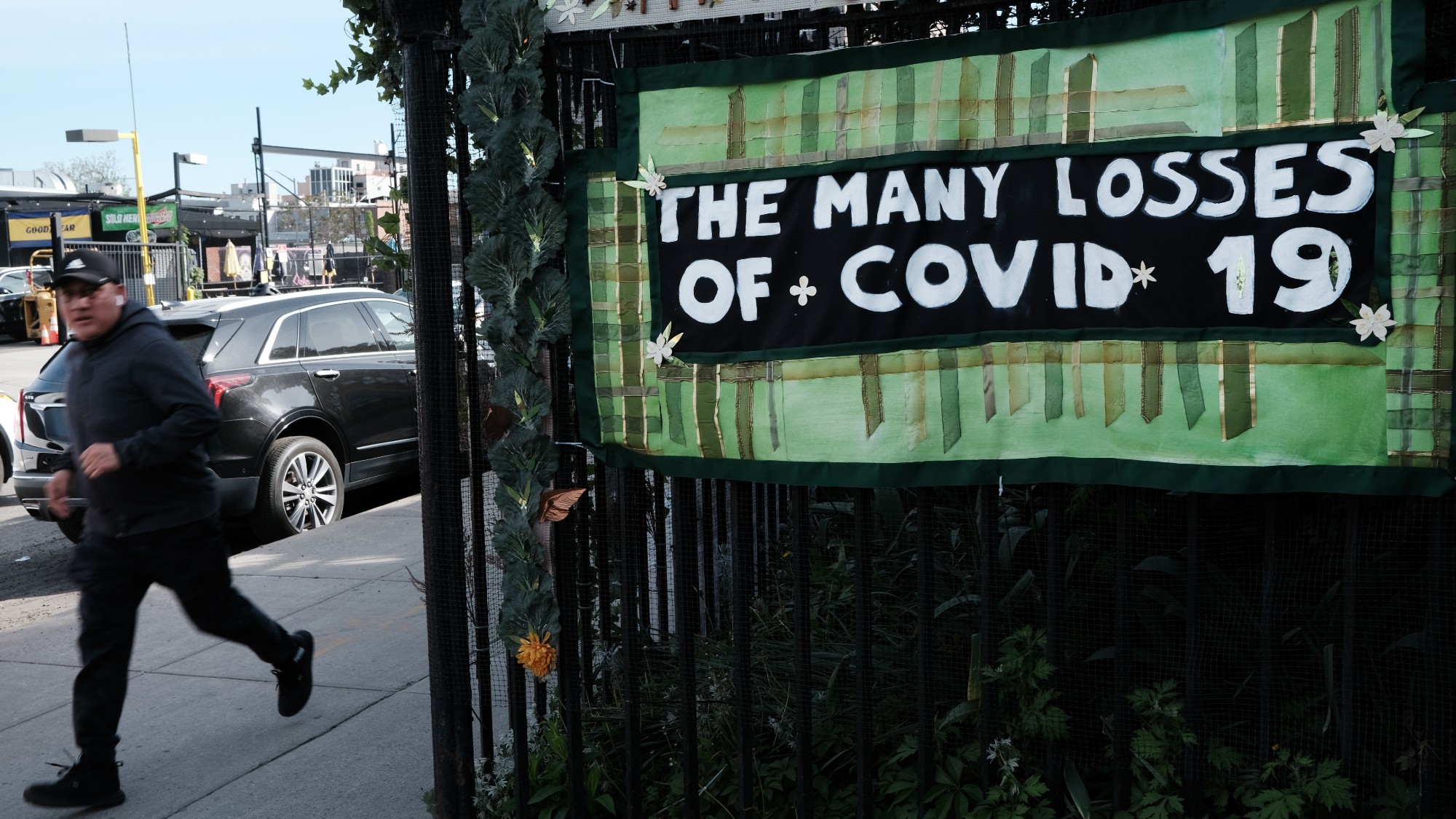The best way to avoid a coronavirus depression
Save jobs later by saving small- and medium-sized businesses now


A free daily email with the biggest news stories of the day – and the best features from TheWeek.com
You are now subscribed
Your newsletter sign-up was successful
On the eve of World War One, British Foreign Secretary Sir Edward Grey famously remarked, "The lamps are going out all over Europe, we shall not see them lit again in our life-time." It was with that quote firmly in mind that J.P. Morgan, America's largest bank, put out an economic report yesterday titled, "The lamps are going out all across the economy."
It's hardly an understatement. The banks think the coronavirus-paralyzed U.S. economy will shrink by 4.0 percent on an annualized basis this quarter and by an astonishing 14.0 percent in the second quarter. And that basically sudden-stop forecast is no outlier. The growing Wall Street consensus is that the economy might shrink by at least 10 percent from April through June, which would match the largest quarterly contraction since those numbers started being calculated in the postwar era.
Simply put, the U.S. economy is shutting down. But that's kind of okay — at least for a bit — since halting economic activity is part of America's public health response to COVID-19. Government at all levels wants Americans to stay home as much as possible to help slow and stop the deadly contagion. This is nothing like a traditional downturn where policymakers want to stimulate consumer and business demand, ASAP.
The Week
Escape your echo chamber. Get the facts behind the news, plus analysis from multiple perspectives.

Sign up for The Week's Free Newsletters
From our morning news briefing to a weekly Good News Newsletter, get the best of The Week delivered directly to your inbox.
From our morning news briefing to a weekly Good News Newsletter, get the best of The Week delivered directly to your inbox.
The good news is that these same Wall Street gloomers think a successful, testing-based health response would mean the steep economic drop could potentially be followed by an almost equally steep ascent in the second half. The faster we can safely leave our homes, the better it will be for jobs and production. But reigniting the economy will be no easy and automatic task — and one made much harder if Washington allows businesses across the country to collapse.
Sending checks to individuals, particularly to lower income Americans, is now popular among many Republicans and Democrats. And for good reason, even if you don't think they're the first step to an Andrew Yang-approved universal basic income. Whether it's a lost job or just lost hours, there will be big gaps in personal budgets that will need to be filled. It seems likely Washington will be sending out checks over the spring. Maybe for $1,000, maybe more.
Checks are only part of the solution, however. And probably not even the most important part. Unless Washington acts quickly to provide direct financial help, many of America's 30 million small- and medium-sized businesses — restaurants, retailers, builders, small manufacturing — are going to fail and throw their employees out of work. Sure, those people could be partially compensated by government checks and other expanded safety-net programs. But it's not just jobs today that will be lost. The businesses themselves will disappear, along with valuable "products, processes, knowledge, and relationships," economists Steven Hamilton of George Washington University and Stan Veuger of the American Enterprise Institute note in a recent analysis.
And recreating those shattered small firms in a post-virus American would be a long process. Forget about a V-shaped recession and recovery. It would look more like a Nike swoosh, as economist Joseph Brusuelas has described it. A sharp decline, followed by an agonizingly slow healing process. Just don't do it.
A free daily email with the biggest news stories of the day – and the best features from TheWeek.com
There are a number of ways to avoid that outcome by helping businesses stay afloat and keep their workers on payroll. Hamilton and Veuger propose loans through private lenders, backed by the Federal Reserve, to cover any revenue shortfalls over a limited period of maybe a few months. These loans would be paired with federal tax credits equal to the full loan amount including interest, as long as the firm didn't slash its workforce.
Another plan comes from Columbia University economist Glenn Hubbard and AEI's Michael Strain. They would have firms borrow perhaps $1 trillion from banks — many of whom already have a business relationship with the firms — to help cover 12 weeks of missed revenue, including payroll and rent. The government would later pay off the loans, provided the companies did not lay off workers. So it's basically a grant with one simple string attached.
Whatever approach Washington chooses, it needs to be both big and doable, ASAP. The fabric of the economy is quickly unraveling. There is no time to attach lots of conditions to the aid, even if cash assistance eventually goes to larger firms. There is simply no time for politicians to haggle as they attempt to, say, use the current crisis as a basis for a future presidential run. Look, even if we don't act now, the economy will eventually recover. The lights will go back on. The Great Coronavirus Recession won't last forever. It will just feel like it did.
Want more essential commentary and analysis like this delivered straight to your inbox? Sign up for The Week's "Today's best articles" newsletter here.
James Pethokoukis is the DeWitt Wallace Fellow at the American Enterprise Institute where he runs the AEIdeas blog. He has also written for The New York Times, National Review, Commentary, The Weekly Standard, and other places.
-
 How the FCC’s ‘equal time’ rule works
How the FCC’s ‘equal time’ rule worksIn the Spotlight The law is at the heart of the Colbert-CBS conflict
-
 What is the endgame in the DHS shutdown?
What is the endgame in the DHS shutdown?Today’s Big Question Democrats want to rein in ICE’s immigration crackdown
-
 ‘Poor time management isn’t just an inconvenience’
‘Poor time management isn’t just an inconvenience’Instant Opinion Opinion, comment and editorials of the day
-
 The billionaires’ wealth tax: a catastrophe for California?
The billionaires’ wealth tax: a catastrophe for California?Talking Point Peter Thiel and Larry Page preparing to change state residency
-
 Bari Weiss’ ‘60 Minutes’ scandal is about more than one report
Bari Weiss’ ‘60 Minutes’ scandal is about more than one reportIN THE SPOTLIGHT By blocking an approved segment on a controversial prison holding US deportees in El Salvador, the editor-in-chief of CBS News has become the main story
-
 Has Zohran Mamdani shown the Democrats how to win again?
Has Zohran Mamdani shown the Democrats how to win again?Today’s Big Question New York City mayoral election touted as victory for left-wing populists but moderate centrist wins elsewhere present more complex path for Democratic Party
-
 Millions turn out for anti-Trump ‘No Kings’ rallies
Millions turn out for anti-Trump ‘No Kings’ ralliesSpeed Read An estimated 7 million people participated, 2 million more than at the first ‘No Kings’ protest in June
-
 Ghislaine Maxwell: angling for a Trump pardon
Ghislaine Maxwell: angling for a Trump pardonTalking Point Convicted sex trafficker's testimony could shed new light on president's links to Jeffrey Epstein
-
 The last words and final moments of 40 presidents
The last words and final moments of 40 presidentsThe Explainer Some are eloquent quotes worthy of the holders of the highest office in the nation, and others... aren't
-
 The JFK files: the truth at last?
The JFK files: the truth at last?In The Spotlight More than 64,000 previously classified documents relating the 1963 assassination of John F. Kennedy have been released by the Trump administration
-
 'There is a certain kind of strength in refusing to concede error'
'There is a certain kind of strength in refusing to concede error'instant opinion 'Opinion, comment and editorials of the day'
